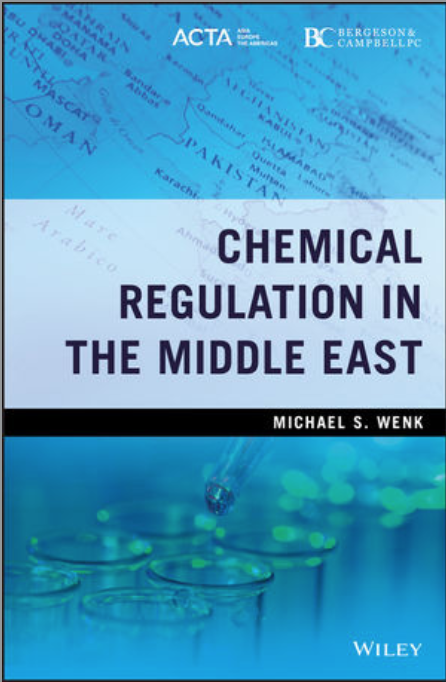The Acta Group and Bergeson & Campbell, P.C. Release New Book Chemical Regulation in the Middle East
The Acta Group (Acta®) and Bergeson & Campbell, P.C. (B&C®) are pleased to announce the publication of “Chemical Regulation in the Middle East,” written by Michael S. Wenk, M.S., Senior Regulatory Consultant with Acta and B&C. This first of its kind handbook offers an essential guide to the patchwork of chemical regulatory programs and the complex system of permits and licenses that manage chemicals in the countries of the Middle East. It also explores the range of ministry, legislative, and other decrees that encompass pesticides, occupational safety and health, as well as safety data sheets (SDS) and product labels that address regulation to widely-varying degrees.
The Middle East has been perceived to be at a relatively nascent stage of developing a comprehensive program for managing chemicals. There may be a variety of reasons for this perception, ranging from a lack of fluency in Arabic, Hebrew, or Urdu, to a somewhat insular culture within the region, to the tendency to focus on geographic regions with more robust commercial and business operations. There are, however, emerging chemical regulatory initiatives underway in the region, and a thorough understanding of these programs and those agencies and entities involved, the legislation in force, and the key areas of concern is vital for compliant and commercially successful operations across the region.
Each chapter of Chemical Regulation in the Middle East begins with a “National Overview,” providing a brief history of the country to establish a sense of context for the items that follow. Next is “Governmental Structure,” detailing the function and structure of the country’s executive, legislative, and judicial branches, giving the reader a firm understanding of the process for proposing, considering, and enacting legislation within each country. Following that section is “Key Chemical Regulatory Agencies,” which provides a holistic view of the major and relatively major Ministries, Authorities, National Bodies, Organizations, and others who have various responsibilities relating to the management of chemical substances, and details situations where multiple agencies share jurisdiction. The final section of each chapter, “Key Chemical Substance Regulations,” provides a comprehensive examination of the main chemical substance laws in force in the country at issue, including the name of the statute, the responsible Authority(ies), and a detailed examination of the requirements, including particular aspects to pay attention to, through a section-by-section walk through of the regulation. An Executive Summary of the book is available on the Acta website.
Chemical Regulation in the Middle East is available for purchase via the John Wiley and Sons Ltd. website.

